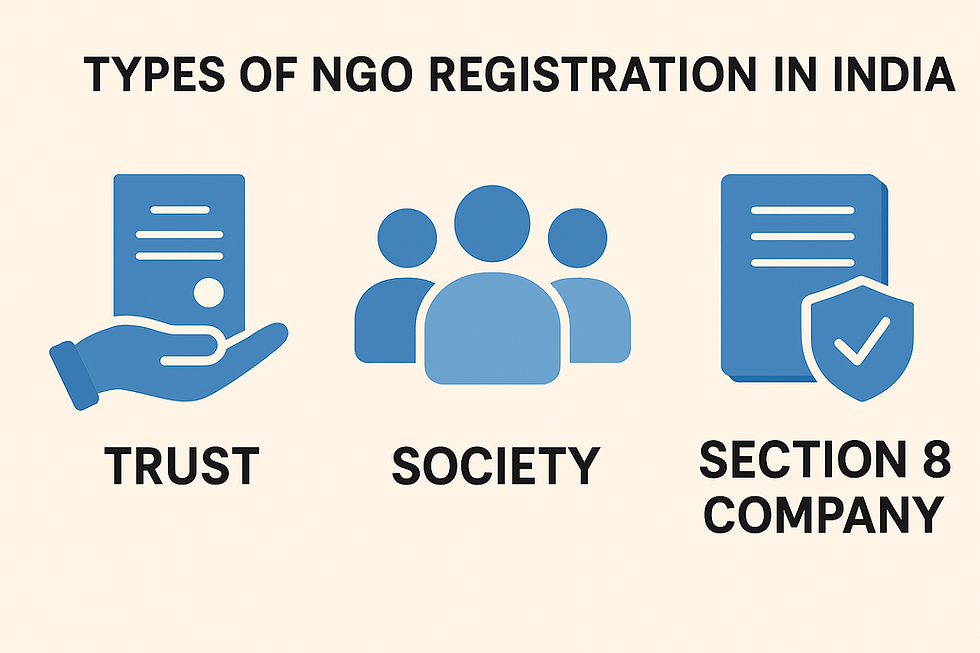Types of NGO Registration in India: Trust, Society, and Section 8 Company
- LaxmiKant Palla
- Aug 29, 2025
- 3 min read

Non-Governmental Organizations (NGOs) play a vital role in driving social change, promoting welfare programs, and supporting underprivileged communities. In India, registering an NGO provides it with legal recognition, credibility, and access to government as well as donor funding. The main types of NGO registration in India are Trust, Society, and Section 8 Company. Each has its own structure, benefits, and compliance requirements, and choosing the right type depends on the goals and operations of the organization.
Trust Registration
A Trust is one of the most common forms of NGO registration in India. It is usually formed to carry out charitable, educational, or religious activities. Trusts are governed under the Indian Trusts Act, 1882 (for private trusts) and state laws for public charitable trusts.
For example, Tata Trusts, one of India’s largest philanthropic organizations, works extensively in education, healthcare, and rural development. Its credibility comes from being registered as a public charitable trust, allowing it to raise funds and collaborate with various institutions.
The process of registering a trust involves creating a Trust Deed, clearly defining the objectives, trustee details, and rules of governance. Once registered, a trust enjoys tax exemptions and recognition under laws like Section 12A and 80G of the Income Tax Act.
Society Registration
A Society is a member-based organization formed for promoting charitable causes like art, culture, science, or social welfare. Societies are governed by the Societies Registration Act, 1860 and require a minimum of seven members to register.
A real-life example is CRY (Child Rights and You), which is registered as a society. It has been instrumental in protecting children’s rights across India. Being a society allows CRY to have a democratic structure with elected members managing its operations, ensuring transparency and participation.
Societies need to draft a Memorandum of Association (MOA) and Rules & Regulations, which act as the foundation of their governance. They are also required to file annual returns and maintain regular compliance with the Registrar of Societies.
Section 8 Company Registration
A Section 8 Company is registered under the Companies Act, 2013 and is formed with the primary aim of promoting charitable objectives such as education, social welfare, environment, or research. Unlike Trusts and Societies, a Section 8 Company enjoys the highest level of credibility and recognition due to its corporate structure.
For instance, Reliance Foundation, a prominent social initiative, is registered as a Section 8 Company. This format gives it greater flexibility to attract corporate partnerships and foreign donations under FCRA (Foreign Contribution Regulation Act).
To register a Section 8 Company, the organization needs approval from the Central Government, along with a Memorandum and Articles of Association. While compliance is stricter, the benefits include enhanced donor trust, professional governance, and eligibility for multiple tax benefits.
Choosing the Right NGO Registration Type
When deciding between a Trust, Society, or Section 8 Company, organizations should consider factors like:
The nature of their activities (charitable, cultural, research-based, etc.)
The size of operations and target geography
Compliance readiness and willingness to maintain transparency
Long-term funding sources and donor preferences
For small-scale, community-based initiatives, a Trust is often sufficient. For member-driven organizations, a Society works best. But for NGOs aiming to attract large-scale funding and operate professionally, Section 8 Company registration is the most suitable.
Conclusion
Understanding the types of NGO registration in India is crucial for anyone planning to start a social initiative. Whether it is a Trust, Society, or Section 8 Company, each format provides a legal identity, credibility, and access to benefits that help NGOs achieve their mission effectively. Choosing the right registration type ensures not only smooth functioning but also long-term growth and sustainability.







Comments